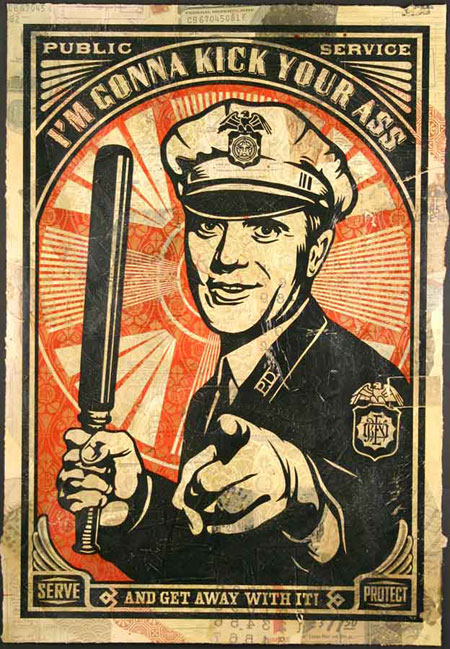Joe Wright
Activist Post
A growing body of (missing) evidence is suggesting that the concept of police dash cams as a valuable tool to record the facts of police and citizen interaction is being selectively used and enforced.
Several recent incidents highlight the aftermath of police forcefully subduing suspects while being recorded on their police cruiser dash cams. Yet, those involved, as well as witnesses, have reported that the treatment was far worse than what the cameras eventually revealed.
Seattle is at the center of this firestorm of controversy after not only tacitly permitting the selective dash cam recording of events, but of apparently hiding what actually has been recorded.
A recent incident involving the arrest of two men on Nov. 16th, 2010 was recorded on officer Brad Richardson’s dash cam, but clearly begins later in the arrest process. The officer can be seen in the video below picking up the suspects off of the ground and putting them in the police cruiser. This suggests that something must have happened previous to where the recording begins. In fact, both suspects insist that they were brutalized in the missing portion of the video. Additionally, the officer’s uniform microphone clearly recorded him telling the suspects that “Yeah, I’m going to make stuff up” with a clear suggestion that they would be framed for a robbery that had just taken place in the area. (Source)
As it turns out, neither man had a criminal record, and neither was charged following the incident, which began after a “felony stop” where the officer engaged the two men with his gun drawn. Despite this, the Office of Professional Accountability (run from the Seattle P.D.) ruled that officer Brad Richardson did nothing wrong, not even questioning why the videotape of the incident begins only in the aftermath where the suspects begin to question their treatment. Left with the officers word against those of “suspects” the police department’s conclusion seems to be an easy one.
To the credit of the media bringing this incident to light, ABC News affiliate KOMO is now suing the Seattle police department for violations of the Public Records Act, as they continue to refuse to allow independent investigators access to their video database. Even at the onset of this investigation it has been made clear that tens of thousands of hours from dash cams have gone missing. Clearly, the incident described above is among those “missing” hours. Despite there being 3 different dash cam videos of the aftermath, none show the critical moment when the alleged abuse took place.
One look at the general smugness of Sgt. Sean Whitcomb during his interview below, as well as his comment to ABCNews.com that “Officers should record, [but] it’s not a violation not to,” should indicate that no answer will be forthcoming . . . willingly.
However, it seems that the Seattle P.D. has developed a new strategy to balk further investigation: suing those who would question their right to distort and hide evidence. Again KOMO News is responsible for kicking the hornets’ nest. When criminal defense attorney, James Egan, filed a request for public records, instead of receiving the 36 dash cam videos he wished to view, he was told that it would be a violation of privacy to release that information. When Egan appealed, he was sued:
‘This is ridiculous. It would be comical if it weren’t alarming,’ he said.
Egan believes the city is retaliating for making these other videos public.
‘I kind of expect for something like this that they really do have something to hide,’ said Egan. (Source)
On a related final note to the issue of where the burden of scrutiny should actually be focused, citizens have begun to arm themselves with the tools to document abuse at the hands of our supposed protectors. Organizations like CopWatch have formed searchable databases of police misconduct, while CopBlock has taken to the streets, and has been instrumental as a decentralized group of activists helping to protect communities from overzealous police.
However, the legal waters are murky regarding citizen journalism, especially in the post-9/11 world. The video below is an excellent overview of the war on citizen journalism, and the general rules that apply.
So far, the attempts to incarcerate those who film police have failed. However, it remains the responsibility of citizens to become active, form coalitions, engage local police departments, and demand that proper access to video surveillance be granted to allow for citizen oversight. It is equally important to establish a dialogue that informs police to become educated about the laws they are responsible for enforcing.
Here is one Seattle man who took action and created his own website — seattlepolicevideo.com — to help people obtain “missing” dash-cam videos:
As more and more actions of the innocent are tracked, traced, and databased, those who manipulate the direction of where cameras truly should be pointed must be held accountable for their violations of public trust and protection.
Additional sources:
http://www.theagitator.com/2010/08/12/when-police-videos-go-missing/
http://www.injusticeeverywhere.com/
Read more articles by Joe Wright here
Please help us combat censorship: vote for this story on Reddit — http://www.reddit.com/r/conspiracy/comments/ptaaw/who_are_police_dash_cams_really_protecting/
linkwithin_text=’Related Articles:’



Be the first to comment on "Who Are Police Dash Cams Really Protecting?"